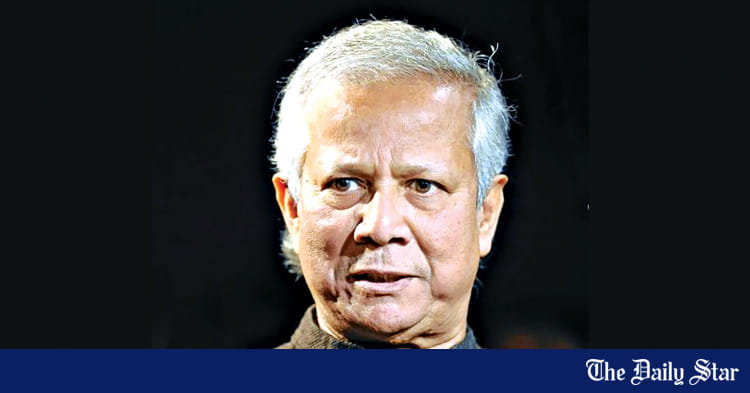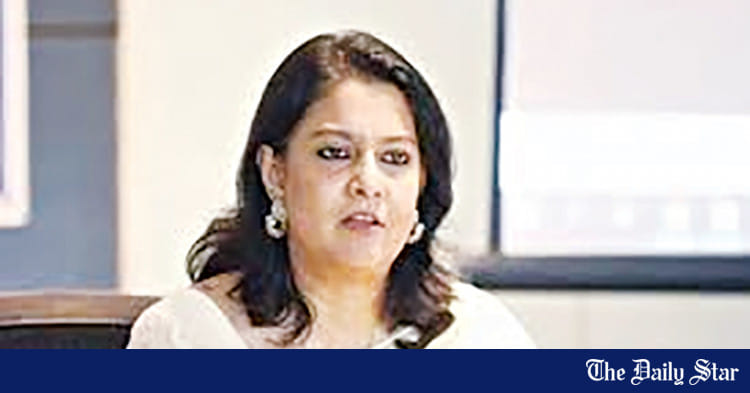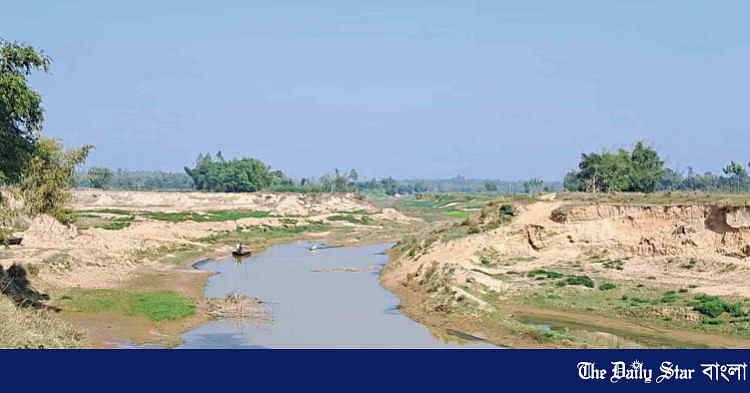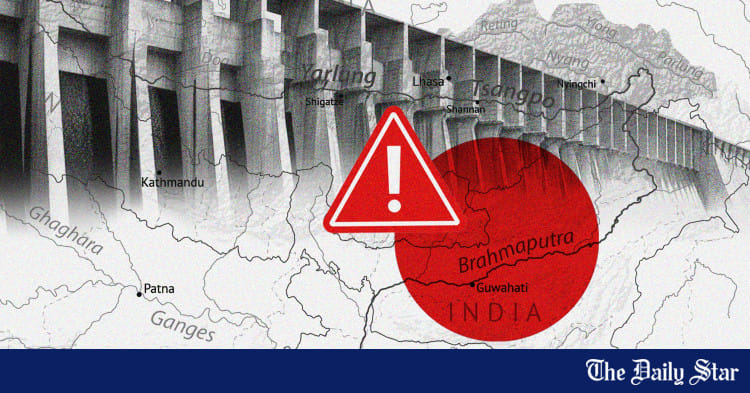Saif
Senior Member
- Messages
- 17,389
- Likes
- 8,373
- Nation

- Residence

- Axis Group

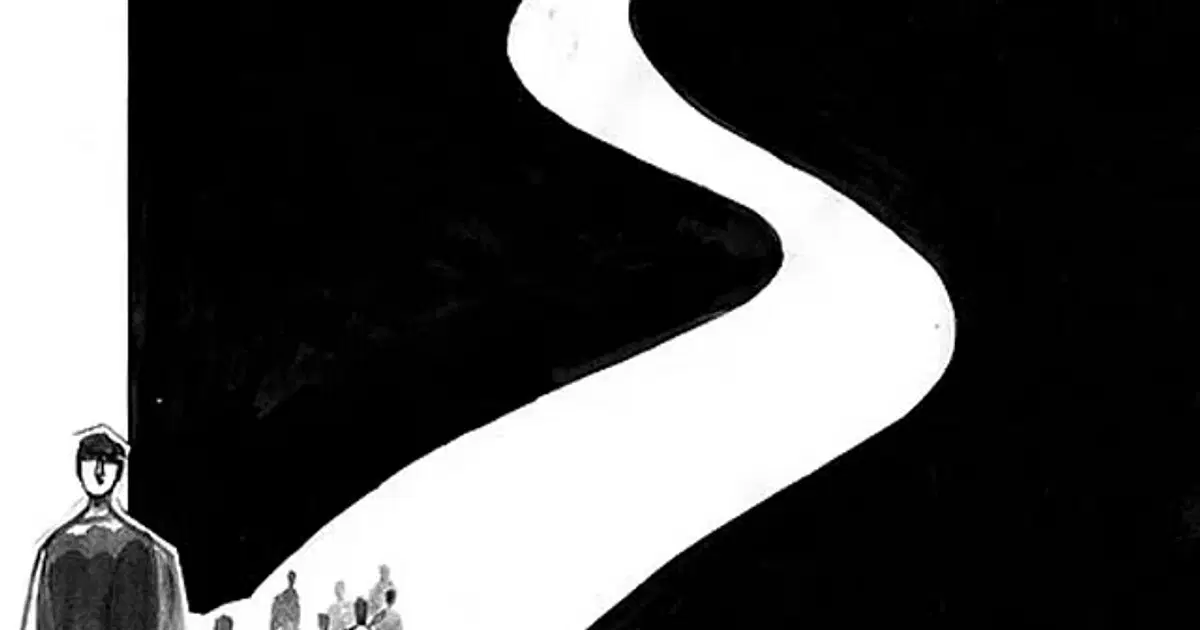
Can India do whatever it wants with common rivers?
Floods have swept across all the districts in the eastern hilly regions of the country over the past few days. The situation in Feni, Comilla, Noakhali, and the hill districts is devastating. While heavy rainfall is a significant cause of these floods, India cannot evade responsibility for the...
Can India do whatever it wants with common rivers?
Tuhin Wadud
Published: 30 Aug 2024, 12: 41

Floods have swept across all the districts in the eastern hilly regions of the country over the past few days. The situation in Feni, Comilla, Noakhali, and the hill districts is devastating. While heavy rainfall is a significant cause of these floods, India cannot evade responsibility for the damage. There are dams and barrages on the Gumti and Muhuri rivers. On the one hand there was heavy rainfall and on the other the sudden release of water without prior notice has caused immense damage to Bangladesh. India, however, does not feel the need to inform Bangladesh in advance.
According to the United Nations International Watercourses Convention, an upstream country has to discuss with the downstream country for constructing infrastructure on the common rivers. If an upstream country constructs infrastructure that causes harm to the downstream country, it is required to provide compensation for any damage. India has done neither. India as an upstream country cannot do whatever it wishes. Moreover, it is against the norms of good neighborliness.
Discussions on Bangladesh-India transboundary or shared rivers are virtually non-existent. Bangladesh’s foreign policy on river issues remains subservient, and there is a lack of diplomatic effort. Whatever India has wanted to impose on Bangladesh in the past has been accepted by every previous government.
I have never heard any government official speak out against India’s anti-Bangladesh water policies. A few advisors of the interim government have voiced concerns, but those must be specific.
No office in Bangladesh knows the exact number of Bangladesh-India trans boundary rivers. The commonly accepted figure is 54, but this is just the recognized count. The number of unrecognized rivers could exceed 200. In my book, "Responsibility in River Protection," I mentioned 69 rivers that are not included in the recognized list. We must first ascertain the actual number of these rivers to negotiate with India on transboundary rivers.
None of India’s actions regarding rivers as an upstream country prove that it is a friend of Bangladesh. In some cases, it seems many times as if India wishes for Bangladesh's demise.
I want to mention an incident from October 2021. At that time, there was no rain in Bangladesh. One night, India opened all the gates of the Teesta Barrage at Gajoldoba in West Bengal. This sudden release caused unprecedented damage to Bangladesh during the off-season. No protest was made by Bangladesh. While it is natural for water to flow downstream when there is rain upstream, the method in which the water is released is inhumane.
There is a Teesta Irrigation Project in Dalia, Nilphamari. Although it was designed to irrigate 111,000 hectares of land, it has never been possible to cultivate more than 90,000 hectares. In 2014, only 65,000 hectares were cultivated.
Before 2014, the water that flowed into the Teesta every year was partially used to maintain the river's flow, with the remaining water used for cultivation. In 2014, India unilaterally withdrew all the water. The cries of the farmers under the irrigation project that year did not reach Dhaka, let alone Delhi. Since 2014, India has tried almost every year to withdraw 100pc of the water.
When rivers are dammed upstream in India to hold back water, it causes two types of damage downstream. During heavy rainfall, they suddenly open all the gates, causing the violent current to damage houses, trees, ponds, and the river itself. In the dry season, when there is no water in the river, the groundwater level drops significantly. This disrupts the normal structure of the soil on the riverbanks. When water flows in with great force during the monsoon, erosion is much more severe than under normal conditions.
The unilateral withdrawal of water from the Teesta River was a test case. India wanted to see how Bangladesh would react if all the water from a river was withdrawn. The previous government did not protest India's actions, so now they are working on withdrawing water from the Dharla River. They plan to divert the Dharla's water to the Teesta. India will also withdraw water from the intermediary rivers between the Dharla and the Teesta.
Bangladesh has not yet taken the necessary steps to seek legal redress. In 1997, the United Nations passed a Watercourses Convention, which stated that the convention would come into effect once 35 countries ratified it.
After the 34th country ratified it, the convention remained in limbo for a long time. Bangladesh highly needs this convention. Yet, Bangladesh has not ratified it till date. The convention came into force in 2014 when Vietnam became the 35th country to ratify it. Unfortunately, Bangladesh has still not participated in it. By ratifying the convention, Bangladesh has the opportunity to seek redress through the United Nations.
It is unacceptable that different rivers in the country will continue to suffer various types of damage, and Bangladesh will merely stand by and watch.
Therefore, it is essential to establish basin-based and rights-based bilateral management for each of the approximately 200 shared rivers. If India does not agree, Bangladesh must seek redress through the United Nations as per the International Watercourses Convention.
*Tuhin Wadud is a professor at the Department of Bengali at Begum Rokeya University and the director of the river protection organization Riverine People.
Tuhin Wadud
Published: 30 Aug 2024, 12: 41
Floods have swept across all the districts in the eastern hilly regions of the country over the past few days. The situation in Feni, Comilla, Noakhali, and the hill districts is devastating. While heavy rainfall is a significant cause of these floods, India cannot evade responsibility for the damage. There are dams and barrages on the Gumti and Muhuri rivers. On the one hand there was heavy rainfall and on the other the sudden release of water without prior notice has caused immense damage to Bangladesh. India, however, does not feel the need to inform Bangladesh in advance.
According to the United Nations International Watercourses Convention, an upstream country has to discuss with the downstream country for constructing infrastructure on the common rivers. If an upstream country constructs infrastructure that causes harm to the downstream country, it is required to provide compensation for any damage. India has done neither. India as an upstream country cannot do whatever it wishes. Moreover, it is against the norms of good neighborliness.
Discussions on Bangladesh-India transboundary or shared rivers are virtually non-existent. Bangladesh’s foreign policy on river issues remains subservient, and there is a lack of diplomatic effort. Whatever India has wanted to impose on Bangladesh in the past has been accepted by every previous government.
I have never heard any government official speak out against India’s anti-Bangladesh water policies. A few advisors of the interim government have voiced concerns, but those must be specific.
No office in Bangladesh knows the exact number of Bangladesh-India trans boundary rivers. The commonly accepted figure is 54, but this is just the recognized count. The number of unrecognized rivers could exceed 200. In my book, "Responsibility in River Protection," I mentioned 69 rivers that are not included in the recognized list. We must first ascertain the actual number of these rivers to negotiate with India on transboundary rivers.
None of India’s actions regarding rivers as an upstream country prove that it is a friend of Bangladesh. In some cases, it seems many times as if India wishes for Bangladesh's demise.
I want to mention an incident from October 2021. At that time, there was no rain in Bangladesh. One night, India opened all the gates of the Teesta Barrage at Gajoldoba in West Bengal. This sudden release caused unprecedented damage to Bangladesh during the off-season. No protest was made by Bangladesh. While it is natural for water to flow downstream when there is rain upstream, the method in which the water is released is inhumane.
There is a Teesta Irrigation Project in Dalia, Nilphamari. Although it was designed to irrigate 111,000 hectares of land, it has never been possible to cultivate more than 90,000 hectares. In 2014, only 65,000 hectares were cultivated.
Before 2014, the water that flowed into the Teesta every year was partially used to maintain the river's flow, with the remaining water used for cultivation. In 2014, India unilaterally withdrew all the water. The cries of the farmers under the irrigation project that year did not reach Dhaka, let alone Delhi. Since 2014, India has tried almost every year to withdraw 100pc of the water.
When rivers are dammed upstream in India to hold back water, it causes two types of damage downstream. During heavy rainfall, they suddenly open all the gates, causing the violent current to damage houses, trees, ponds, and the river itself. In the dry season, when there is no water in the river, the groundwater level drops significantly. This disrupts the normal structure of the soil on the riverbanks. When water flows in with great force during the monsoon, erosion is much more severe than under normal conditions.
The unilateral withdrawal of water from the Teesta River was a test case. India wanted to see how Bangladesh would react if all the water from a river was withdrawn. The previous government did not protest India's actions, so now they are working on withdrawing water from the Dharla River. They plan to divert the Dharla's water to the Teesta. India will also withdraw water from the intermediary rivers between the Dharla and the Teesta.
Bangladesh has not yet taken the necessary steps to seek legal redress. In 1997, the United Nations passed a Watercourses Convention, which stated that the convention would come into effect once 35 countries ratified it.
After the 34th country ratified it, the convention remained in limbo for a long time. Bangladesh highly needs this convention. Yet, Bangladesh has not ratified it till date. The convention came into force in 2014 when Vietnam became the 35th country to ratify it. Unfortunately, Bangladesh has still not participated in it. By ratifying the convention, Bangladesh has the opportunity to seek redress through the United Nations.
It is unacceptable that different rivers in the country will continue to suffer various types of damage, and Bangladesh will merely stand by and watch.
Therefore, it is essential to establish basin-based and rights-based bilateral management for each of the approximately 200 shared rivers. If India does not agree, Bangladesh must seek redress through the United Nations as per the International Watercourses Convention.
*Tuhin Wadud is a professor at the Department of Bengali at Begum Rokeya University and the director of the river protection organization Riverine People.

